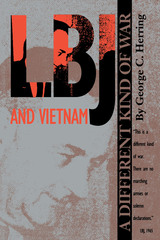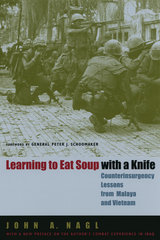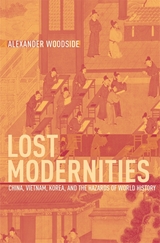6 start with L start with L

Decades later, the Vietnam War remains a divisive memory for American society. Partisans on all sides still debate why the war was fought, how it could have been better fought, and whether it could have been won at all.
In this major study, a noted expert on the war brings a needed objectivity to these debates by examining dispassionately how and why President Lyndon Johnson and his administration conducted the war as they did. Drawing on a wealth of newly released documents from the LBJ Library, including the Tom Johnson notes from the influential Tuesday Lunch Group, George Herring discusses the concept of limited war and how it affected President Johnson's decision making, Johnson's relations with his military commanders, the administration's pacification program of 1965-1967, the management of public opinion, and the "fighting while negotiating" strategy pursued after the Tet Offensive in 1968.
The author's in-depth analysis exposes numerous flaws in Johnson's management of the war. In Herring's view, the Johnson administration lacked any overall strategy for conducting the war. No change in approach was ever discussed, despite popular and even administration dissatisfaction with the progress of the war, and no oversight committee coordinated the activities of the military services and various governmental agencies, which were left to follow their own, often conflicting, agendas.

In examining these two events, Nagl—the subject of a recent New York Times Magazine cover story by Peter Maass—argues that organizational culture is key to the ability to learn from unanticipated conditions, a variable which explains why the British army successfully conducted counterinsurgency in Malaya but why the American army failed to do so in Vietnam, treating the war instead as a conventional conflict. Nagl concludes that the British army, because of its role as a colonial police force and the organizational characteristics created by its history and national culture, was better able to quickly learn and apply the lessons of counterinsurgency during the course of the Malayan Emergency.
With a new preface reflecting on the author's combat experience in Iraq, Learning to Eat Soup with a Knife is a timely examination of the lessons of previous counterinsurgency campaigns that will be hailed by both military leaders and interested civilians.


For over half a century, the Vietnamese people have endured the harmful legacies of Agent Orange, the toxic herbicide used by the American military as a type of chemical warfare. While scientists and politicians continue to debate how to best address its human and environmental consequences, the nearly three million Vietnamese whose lives have been shaped by its lingering effects have been largely left out of the conversation.
To understand how Agent Orange has impacted the lives and livelihoods of everyday Vietnamese people, Diane Niblack Fox interviewed families and individuals living with its aftereffects across the northern, central, and southern regions of the country. In powerfully written prose, Fox shares the personal accounts of villagers, as they describe caring for loved ones with chronic illnesses and disabilities and their attempts to secure medical and financial assistance. Living with Agent Orange also chronicles the moving stories of rebuilt lives, of family and community support, and of the overriding power of the human spirit.

In Lost Modernities Alexander Woodside offers a probing revisionist overview of the bureaucratic politics of preindustrial China, Vietnam, and Korea. He focuses on the political and administrative theory of the three mandarinates and their long experimentation with governments recruited in part through meritocratic civil service examinations remarkable for their transparent procedures.
The quest for merit-based bureaucracy stemmed from the idea that good politics could be established through the "development of people"--the training of people to be politically useful. Centuries before civil service examinations emerged in the Western world, these three Asian countries were basing bureaucratic advancement on examinations in addition to patronage. But the evolution of the mandarinates cannot be accommodated by our usual timetables of what is "modern." The history of China, Vietnam, and Korea suggests that the rationalization processes we think of as modern may occur independently of one another and separate from such landmarks as the growth of capitalism or the industrial revolution.
A sophisticated examination of Asian political traditions, both their achievements and the associated risks, this book removes modernity from a standard Eurocentric understanding and offers a unique new perspective on the transnational nature of Asian history and on global historical time.

Traditionally seen as a master of domestic politics, Lyndon Johnson is frequently portrayed as inept in foreign relations, consumed by the war in Vietnam, and unable to provide vision or leadership for the Western alliance. In this persuasive revisionist history, Thomas Alan Schwartz takes issue with many of the popular and scholarly assumptions about the president seen as the classic "ugly American."
In the first comprehensive study of Johnson's policy toward Europe--the most important theater of the Cold War--Schwartz shows a president who guided the United States with a policy that balanced the solidarity of the Western alliance with the need to stabilize the Cold War and reduce the nuclear danger. He faced the dilemmas of maintaining the cohesion of the alliance, especially with the French withdrawal from NATO, while trying to reduce tensions between eastern and western Europe, managing bitter conflicts over international monetary and trade policies, and prosecuting an escalating war in Southeast Asia.
Impressively researched and engagingly written, Lyndon Johnson and Europe shows a fascinating new side to this giant of twentieth-century American history and demonstrates that Johnson's diplomacy toward Europe deserves recognition as one of the most important achievements of his presidency.
READERS
Browse our collection.
PUBLISHERS
See BiblioVault's publisher services.
STUDENT SERVICES
Files for college accessibility offices.
UChicago Accessibility Resources
home | accessibility | search | about | contact us
BiblioVault ® 2001 - 2024
The University of Chicago Press









